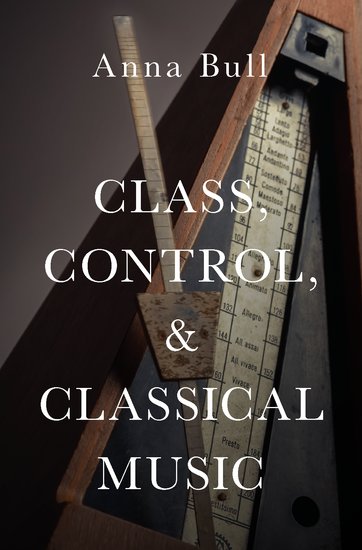
HC: Can you firstly tell me a bit about who you are and what you do?
AB: I'm a senior lecturer in sociology at the University of Portsmouth, but I came to sociology later in life after training and working as a musician. I studied piano and cello performance in New Zealand as my undergraduate degree, then moved to Scotland and did a postgraduate diploma in piano accompaniment at the Royal Scottish Academy of Music & Drama [now the Royal Conservatoire of Scotland]. I also played as a freelancer and worked on music education projects.
I was really passionate about classical music as a teenager, but as I moved through my twenties, I started to become a bit disillusioned and started questioning the world I found myself in. Eventually I decided I didn't want to be a musician anymore – these doubts and questions became too strong for me. So, I went back to university and studied sociology as an undergraduate degree. I did not intend to write about music – I really didn't!
HC: And here you are with a book about classical music! Can you tell me about it?
AB: My book came out last year. It is an academic book, but there are quite a few chapters that are accessible to a wider audience as well – you might just want to skip Chapter One! Really, it's asking the question: why are classical music and classical music education in the UK still so white and middle class? The book is trying to answer that question, and it turns out it's quite complicated.
I also talk about gender and gender inequalities in classical music, because obviously lots of girls and young women get involved in classical music, but then as you move through the profession, there are fewer and fewer women in positions of leadership and authority. I'm really trying to understand the everyday culture of what goes on in classical music and asking what might need to change.



HC: What do you mean by the phrase ‘pedagogy of correction’ in the book?
AB: From observing the rehearsals of the youth music groups in my study and interviewing young musicians, I came up with the idea that a large part of what makes classical music education distinctive is that it is characterised by this pedagogy of correction. What I mean by this is that the main content of lessons or rehearsals is correcting errors, because precision, accuracy, and detail are so important for classical music.
Of course, this plays into the debate about teaching technical skills and teaching musicality, but I would say that technical skills – and this idea of correction that goes with them – tend to override the pupil being able to explore their own musical voice in learning classical music. This has wider implications for the culture of classical music and who feels comfortable in that space.
HC: Can you expand on the connections you have made between a culture of correcting errors and issues around diversity and inclusion in classical music education?
AB: The young people in my study were in their teens and early twenties and they all agreed on the importance of accuracy and precision in classical music. But I found that this pedagogy did create, to some extent, a culture of fear in some rehearsals. Some of the young people described being scared of teachers or conductors, or scared of judgement by their peers.
What I noticed was that this judgement and correction, and the wider culture of fear that this could bring about, affected most strongly those who felt that they didn't have the right to be in classical music spaces. This was likely to be people who were not the usual middle-class classical music pupil.
This draws on an idea from sociologist Pierre Bourdieu, who talks about reasons why middle-class pupils do well in the education system. One of the reasons is that middle-class pupils know how the system works – there's a common culture between their home life and their school life. I'm suggesting that this is similar in classical music education.
The ‘rules of the game’ are really clear for the middle-class kids, and not so clear to those who are from different groups in society, particularly working-class groups. So, this pedagogy of correction was experienced differently by people from different groups.
HC: Many people say that unequal access to classical music is about economic barriers. Does your research support this argument?
AB: Just to be clear, there's no doubt that economic barriers to classical music participation are hugely significant. But I think it's also crucial to recognise that these are not the only barriers. Even when we make classical music education accessible to all children for free, we still see certain groups doing well and some kids dropping out and not wanting to do it. So, we have to look at the ways in which the normal culture in classical music education can be unwelcoming or uncomfortable to some groups.
For example, we have to think about how intensive parenting – [often said to be] one aspect of middle-class culture – fits very well with classical music education. It's about what music-making means – the norm in classical music is that you spend years and years working towards proficiency. The instruments and the repertoire are really difficult, let's face it, and there's a long lead period to actually getting good at your instrument.
So, it suits those who are able to make that long-term investment, both financially and being willing to start something they're not going to be good at for another five years. For middle-class parents, that investment is part of the normal practice of middle-class parenting, but it doesn't make sense for everybody to invest in the future, whether that's financially or in terms of the day-to-day effort of getting your children to practice – not all parents have that time, or want to spend the time that they do have with their child making them practice.
HC: You've also spoken about a ‘hidden curriculum’. Can you explain this?
AB: The hidden curriculum is this idea that a lot of what is being learnt in classical music is not actually the overt content of lessons – it's what students are learning under the radar. They're learning about what is acceptable – the normal, everyday things that are taken for granted and not even noticed: the ‘rules of the game’.
One example of this that I found in my research is what I call ‘serious’ music versus ‘fun’ music. Fun music could include film music, which one conductor in my study talked about as having ‘less nutrition value’ than serious music. It also included musical genres [traditionally associated with] people of colour, such as jazz, or Latin American music. So, in my study these were seen as fun, but it was definitely valued less than the serious music in various ways.
HC: So, what would you suggest teachers do in response to your research?
AB: If we want to think about how we can renew classical music as a living tradition, one way is by teachers reflecting on their own musical education and using this to think about whether they want to do things the same way, or whether they want to do things differently. A colleague – Byron Dueck – has talked about a pedagogy of non-interference. Basically, this means that the teacher's role was usually not to interfere with what the child was doing, but just to sit there and be with them. And then if they needed help, to give that help. Teachers are obviously thinking about these kinds of questions, but we haven't really had the systematic discussion of when it is appropriate to let the music override the corrections.
Another thing that music teachers can do is to think about how different genres of music and different groups of music identities are reflected in their teaching. This is happening more and more, which is brilliant, but we also need to think about how we're teaching that repertoire. If you're teaching different genres, there are going to be different ways of sharing musical ideas.
It's fantastic that people are diversifying and trying to make a change, but there are still these innate hierarchies being set up, which are hard to notice until someone points them out to you. And that's my job as a sociologist, to make everyone feel uncomfortable.
For her next project, Dr Anna Bull will be working with Sound Connections in partnership with Lewisham Music hub to ask how the ‘youth voice’ can be incorporated into classical music pedagogy.
Class, Control, & Classical Music is published by Oxford University Press.
Follow Anna on Twitter @anna_bull_
A free reflective practice tool for teachers is available on Coursera: www.coursera.org/learn/music-education. The course is run by James Humberstone from the University of Sydney and is recommended by Dr Anna Bull.








